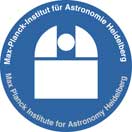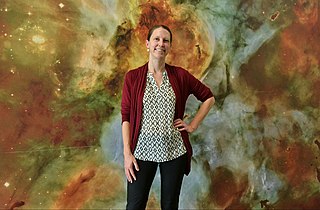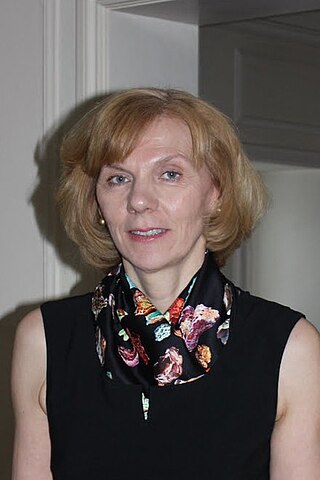
The Max Planck Society for the Advancement of Science is a formally independent non-governmental and non-profit association of German research institutes. Founded in 1911 as the Kaiser Wilhelm Society, it was renamed to the Max Planck Society in 1948 in honor of its former president, theoretical physicist Max Planck. The society is funded by the federal and state governments of Germany.

The Max-Planck-Institut für Astronomie is a research institute of the Max Planck Society (MPG). It is located in Heidelberg, Baden-Württemberg, Germany near the top of the Königstuhl, adjacent to the historic Landessternwarte Heidelberg-Königstuhl astronomical observatory. The institute primarily conducts basic research in the natural sciences in the field of astronomy.
Edward Seidel is an American academic administrator and scientist serving as the president of the University of Wyoming since July 1, 2020. He previously served as the Vice President for Economic Development and Innovation for the University of Illinois System, as well as a Founder Professor in the Department of Physics and a professor in the Department of Astronomy at the University of Illinois at Urbana-Champaign. He was the director of the National Center for Supercomputing Applications at Illinois from 2014 to 2017.

Cosmology@Home is a volunteer computing project that uses the BOINC platform and was once run at the Departments of Astronomy and Physics at the University of Illinois at Urbana-Champaign. The project has moved to the Institut Lagrange de Paris and the Institut d'Astrophysique de Paris, both of which are located in the Pierre and Marie Curie University.
Alexander Borisovich Zamolodchikov is a Russian physicist, known for his contributions to conformal field theory, statistical mechanics, string theory and condensed matter physics.
Girish S. Agarwal, Fellow of the Royal Society UK, is a theoretical physicist. He is currently at the Texas A & M University with affiliations to the Departments of Biological and Agricultural Engineering, Physics and Astronomy, and the Institute for Quantum Science and Engineering. Earlier he worked as Noble Foundation Chair and the Regents Professor at the Oklahoma State University. He is a recognized leader in the field of quantum optics and also has made major contributions to the fields of nonlinear optics, nanophotonics and plasmonics. In 2013 he published the textbook "Quantum Optics", covering a wide range of recent developments in the field, which has been well received by the community.
Roberto Car is an Italian physicist and the Ralph W. Dornte *31 Professor in Chemistry at Princeton University, where he is also a faculty member in the Princeton Institute for the Science and Technology of Materials. He conducts research on the simulation of molecular dynamics phenomena.

Donald Delbert Clayton was an American astrophysicist whose most visible achievement was the prediction from nucleosynthesis theory that supernovae are intensely radioactive. That earned Clayton the NASA Exceptional Scientific Achievement Medal (1992) for “theoretical astrophysics related to the formation of (chemical) elements in the explosions of stars and to the observable products of these explosions”. Supernovae thereafter became the most important stellar events in astronomy owing to their profoundly radioactive nature. Not only did Clayton discover radioactive nucleosynthesis during explosive silicon burning in stars but he also predicted a new type of astronomy based on it, namely the associated gamma-ray line radiation emitted by matter ejected from supernovae. That paper was selected as one of the fifty most influential papers in astronomy during the twentieth century for the Centennial Volume of the American Astronomical Society. He gathered support from influential astronomers and physicists for a new NASA budget item for a gamma-ray-observatory satellite, achieving successful funding for Compton Gamma Ray Observatory. With his focus on radioactive supernova gas Clayton discovered a new chemical pathway causing carbon dust to condense there by a process that is activated by the radioactivity.

Sorbonne University Association is a group of 10 academic institutions associated with the Sorbonne University. After the fusion between Paris-Sorbonne University and Pierre and Marie Curie University under the name Sorbonne University in 2018, the university system Sorbonne Universités changed its name to Association Sorbonne Université.
Timothy Maurice Paul Tait is a Canadian-American particle physicist known for his contributions to the theoretical physics and particle physics, particularly in the field of dark matter. He is currently a professor in the Department of Physics and Astronomy at the University of California, Irvine.

Timothy Laurence Killeen is a British and American geophysicist, space physicist, professor, and university administrator. Killeen took office as the president of the University of Illinois system in 2015. He has been the principal investigator on research projects for NASA and the National Science Foundation. Killeen has authored more than 150 publications in peer-reviewed journals as well as more than 300 other publications and papers. He has served on various White House committees and task forces and is a past editor-in-chief of the Journal of Atmospheric and Solar-Terrestrial Physics.

Jun Ye is a Chinese-American physicist at JILA, National Institute of Standards and Technology, and the University of Colorado Boulder, working primarily in the field of atomic, molecular, and optical physics.

Heather A. Knutson is an astrophysicist and professor of planetary science at California Institute of Technology in the Division of Geological and Planetary Sciences. Her research is focused on the study of exoplanets, their composition and formation.
Emily Levesque is an American astronomer, author, and associate professor in the Department of Astronomy at the University of Washington. She is renowned for her work on massive stars and using these stars to investigate galaxy formation. She is also the author of three books, including the 2020 popular science book The Last Stargazers: The Enduring Story of Astronomy's Vanishing Explorers.
Mukul Ranjan Kundu, was an Indian solar physicist, known best as a pioneer of radio observations of the Sun. Early in his career, he showed that the Sun's 10.7 centimetre radio flux is correlated with the level of ionisation in the Earth's ionosphere. The 10.7 cm flux is now used as a standard proxy for the level of magnetic activity on the Sun. He served on the editorial board of the journal Solar Physics and was awarded the George Ellery Hale Prize in 2007.
Nadya Mason is dean of the Pritzker School of Molecular Engineering at The University of Chicago, receiving that appointment in October 2023. Prior to joining The University of Chicago, she was the Rosalyn Sussman Yalow Professor of Physics at the University of Illinois at Urbana-Champaign. As a condensed matter experimentalist, she works on the quantum limits of low-dimensional systems. Mason was the Director of the Illinois Materials Research Science and Engineering Center (I-MRSEC), and Director of the Beckman Institute for Advanced Science and Technology from September 2022 through September 2023. She was the first woman and woman of color to work as the director at the institute. In 2021, she was elected to the National Academy of Sciences.

Mirjam Cvetič is a Slovenian-American theoretical physicist at the University of Pennsylvania, where she is Fay R. and Eugene L. Langberg Professor of Physics and of Mathematics. Cvetič has a background in basic theory, phenomenology and conducts research that bridges the gap between basic theory and experimental consequences on certain theories. Her research includes the applications of string theory, M-theory to black hole behavior, and particle phenomenology. Also, she has published highly cited works on supersymmetry, more than two hundred journal articles and is the editor of Physics Letter B.
Gabrielle D. Allen is a British and American computational astrophysicist known for her work in astrophysical simulations and multi-messenger astronomy, and as one of the original developers of the Cactus Framework for parallel scientific computation. She is a professor of mathematics and statistics at the University of Wyoming.

Majed Chergui is a Swiss and French physicist specialized in ultrafast dynamics of light-induced processes. He is a Honorary professor of the EPFL and the Université de Lausanne. He was founding director of the Lausanne Centre for Ultrafast Science (LACUS) at the EPFL between 2016 and 2021.
Alexandre Lazarian is an astrophysicist. He is a professor of astronomy at the University of Wisconsin–Madison with a joint appointment at the Department of Physics. He is a fellow of the American Physical Society.









